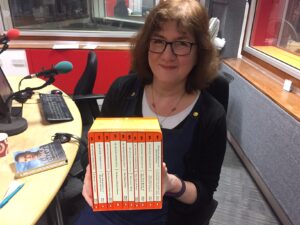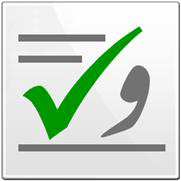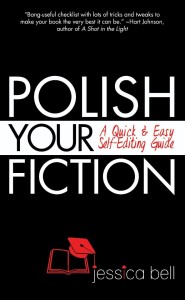
Detecting writing tics – Debbie Young is on the case, taking inspiration from a Sherlock Holmes box set (Photo by Dominic Cotter of BBC Radio Gloucestershire)
For this #WritersWednesday, ALLi Advice Center Editor and author Debbie Young shares her favourite top tip to help indie authors eliminate over-used words and repetitive habits in any piece of writing of any length in their self-published books in any genre.
I've always been conscious of how easy it is to unconsciously repeat your pet words in a piece of writing. In a PR day job I had years ago, I was forever declaring things “delightful”, till I started to get teased about my Pollyana nature.
I once worked for a quirky indie PR firm in an old banana warehouse near London Bridge (best office ever!) where we had a list of banned words that we were not allowed to use. I still can't use the words plethora” or “myriad” without a pang of guilt.
But words don't have to be that fancy to become irritating if over-used. Too many “Buts” at the beginning of sentences (or any at all, if you're old school), or too many “he said” speech tags, can cause readers to groan.
The Wonder of Wordclouds
So I was glad to realise not long ago that there's a really easy way to identify over-used words in a piece of text at the touch of a button: by conjuring up wordclouds. (Thanks to Jessica Bell for pointing it out in her succinct writing guide, Polish Your Fiction.)
Wordclouds were all the rage a few years ago for posting on social media amongst other things. At one point, Facebook was offering them one Christmas, drawing on your past year's posts in an attempt to summarise your year.
Wordclouds are also a great way to spot over-used words in your writing.
Giving your whole text, or a chapter at a time, or a blog post, the once-over can only help improve your writing.
Functional but Fun
Some writing programmes such as Scrivener have features built in for this purpose.
However, a fun and simple solution is to cut and paste your copy into a dedicated free programme such as www.tagcrowd.com, available whatever writing programme you use. Another popular one – possibly the original – was www.wordle.com, though unfortunately that doesn't seem to work across as many platforms.
For me, anything that injects fun into the exhausting process of self-editing has got to be good news.
Actually, I do enjoy self-editing, but when you're at it for hours, it is arduous. Taking a moment to lighten up gives me the strength to keep going!
An Example of a Writing Tic Reined In
For example, I hadn't realised until I created a wordcloud that I used the word “realised” so much in an early draft of Best Murder in Show (due out in April). Subsequently I cut the incidences of the word from 66 (that's one in every thousand words in this particular book) to 19. Another of my most featured words turned out to be “tea”, but as some of the action takes place in a tea room, I was able to keep my tea with a clear conscience.
Wordclouds are most helpful when you have a longer piece of text than this post, but to show you how it works, here's one I've just created of the copy in this post. I now I realised I've over-used “over-used”. See what I did there? 🙂






[…] Writing: 1 Easy Way to Self-Edit Writing Tics […]
[…] Writing: 1 Easy Way to Self-Edit Writing Tics […]
Scrivener has it built-in? Awesome to know–thanks!
This is fun, thank you. Thanks for the reminder of skills you have integrated Isabeau. I remain grateful to my 5th grade teacher, who explicitly taught me grammar.
it’s an interesting approach, however, i’m old school: know the words that just never should be used (very); the words that should almost never be used (adverbs – they mean the wrong word has been used); repeated words especially of action in the same paragraph; words that don’t fit the tone of the genre (for example, because I write scifi set in the past — Atlantis — I avoid common American slang and even most idiomatic expressions). And as for that but at the beginning of a sentence, years ago someone told me what that word does: it negates everything that came before it. I DO start with dialog following how people would naturally speak (depending upon their education level) but with every editing pass, I look for those repeated words. I’m looking for other things too. I think it’s a good thing for writers to keep in mind as they tweak — as one instructor said, every word needs to count.
Helpful and fun. Thanks for the information.
I hadn’t thought of this approach, Debbie. I use Hermetic Word Frequency counter, but you’ve given me new ideas to play with. Thanks!